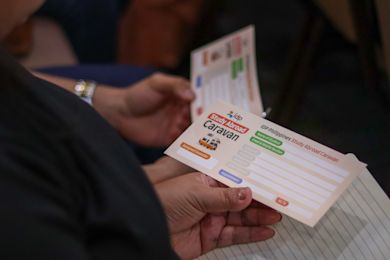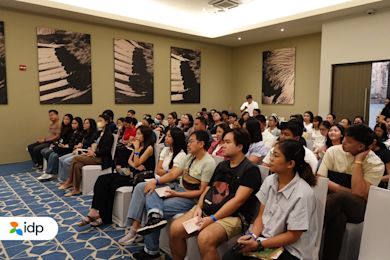- News and articles
- Events
- Find usIDP AustraliaIDP BahrainIDP BangladeshIDP CambodiaIDP CanadaIDP ChinaIDP EgyptIDP GhanaIDP Hong KongIDP IndiaIDP IndonesiaIDP IranIDP JordanIDP KenyaIDP KoreaIDP KuwaitIDP LebanonIDP MalaysiaIDP MauritiusIDP Middle EastIDP NepalIDP New ZealandIDP NigeriaIDP OmanIDP PakistanIDP Saudi ArabiaIDP SingaporeIDP Sri LankaIDP Taiwan, ChinaIDP ThailandIDP TurkeyIDP UAEIDP VietnamIDP Corporate
- Social
- English
Topics covered
- Published: 9 May 2024
As the pandemic subsides, students are getting back into the swing of in-person lessons, however, this means that face-to-face interactions will become the norm.
While this might be fine for everyday social conversations, it gets even more challenging when it comes to presenting in front of a group of people in your class - especially if you are being evaluated!
One of the biggest hurdles students face as they head back to learning on campus is interacting with peers and lecturers when many are used to online lessons. However, this is one challenge you will need to overcome.
By mastering the basics of face-to-face presentation, you’ll set yourself up for success, not just in your university education but also equip yourself with an evergreen skill set that will empower you when you enter the workforce.
It’s Time To Master Your In-Person Presentations!
By mastering the basics of face-to-face presentation, you’ll set yourself up for success, not just in your university education but also equip yourself with an evergreen skill set that will empower you when you enter the workforce.
Thankfully, we have compiled a list of tips and strategies that can kickstart your journey towards acing your presentations one day at a time. Don’t stress yourself out, just keep practicing and you’ll soon become an expert!
8 Strategies To Ace Your Face-To-Face Presentations
1. Keep Your Slides & Presentation Simple
There is a very simple acronym every student should learn and it’s K.I.S.S - which stands for Keep It Simple Stupid!
One of the deadliest mistakes students make is fluffing up their presentation slides with too much information. This will not only drain away any hard-won attention from your speech and presentation, but you might also get confused and feel compelled to explain them further.
Remember that slides are there to add context to your presentation and it should be you and your speech that should direct where the narrative goes!
2. Utilize Creative Visuals & Eliminate Wordy Texts
Another key thing to remember is to use charts, data, and straight-to-the-point visuals to help your viewers quickly grasp what you are trying to say.
Instead of long wordy sentences, why not substitute it with a graph or a chart that will quickly get the point across within seconds? In fact, if there are big numbers and comparisons, this will add weight to your presentation story and add a ‘wow’ factor to your presentations.
Plus, it will help your speech flow better as well!
3. Plan & Structure Your Speech
Planning ahead is important and this includes your presentation speech. If you are new to a presentation, especially a face-to-face one, you want to eliminate any nervousness that might cause you to totally forget your speech!
Thankfully by structuring your speech to include an introduction, a compelling hook and the meat of your presentation, you’ll be able to win attention while ensuring you understand the flow of your own thoughts.
4. Create Cue Cards With Key Pointers
While cue cards might seem elementary, sometimes your presentation is a long one and you need reminders or there are certain facts that you need to present.
Cue cards will help you get your bearings in the middle of a presentation, this is exceptionally powerful if this is a group presentation where you can refresh your memory without interrupting the flow.
5. Memorize Your Introduction & Closing
The most important parts of your presentation are hooking attention and this is the first 30 seconds of your speech as well as the closing 30 seconds that will leave your audience with a deep impact or takeaway.
Try to think in their shoes about what is most important to them. Triggering curiosity or presenting a phenomenal fact are some ways you can make a powerful intro and closing.
6. Practice Your Speech & Presentation
While you can have a good structure and introduction laid out, you cannot neglect to practice your speech. Practice makes perfect.
While you practice, be sure to not just repeat your speech, but focus on your pacing, pitch, and tempo and also remove filler words as you go through your script or pointers.
7. Perfect Your Posture & Hand Gestures
Part of the advantage a face-to-face presentation brings is the ability to use your entire body as well.
This means standing confidently, having a perfect posture, and utilizing hand gestures to direct an idea or emphasize a point!
8. Practice Maintaining Eye Contact With Your Audience
Lastly, while you might be presenting to a group of people, sometimes even a mini-crowd, you’d want to maintain eye contact to really connect with your audience.
Here’s how you can accomplish it. Visualize your audience as individual listeners, sustain eye contact for 1 to 2 seconds per person, and try to involve them in the conversation by asking questions if possible.
Master Your Presentation And Pursue Your Career Aspirations With IDP
Mastering your presentation skills is important but what is your next step towards your dream career?
We can help you in your journey towards your career success!
At IDP, we have a team of education counselors who can offer tailored guidance and assist you throughout your journey. This includes further post-graduate courses and training as well as recommendations on your study destination.
No worries about the course application process, we can help guide you through every step of the way.
Get started with your free counseling session by filling out the inquiry form today.
One account for all your study abroad needs
Create your profile and unlock a wide array of features including personalised recommendations, fast-tracked applications and much more.
Search for articles
Dive into our extensive collection of articles by using our comprehensive topic search tool.















